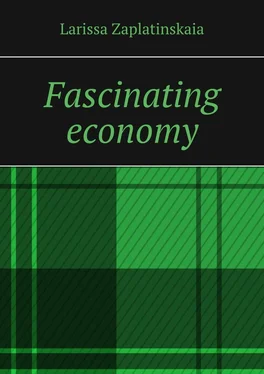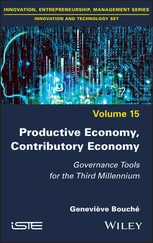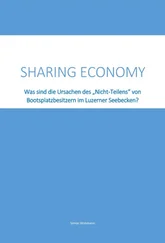Larissa Zaplatinskaia - Fascinating economy
Здесь есть возможность читать онлайн «Larissa Zaplatinskaia - Fascinating economy» — ознакомительный отрывок электронной книги совершенно бесплатно, а после прочтения отрывка купить полную версию. В некоторых случаях можно слушать аудио, скачать через торрент в формате fb2 и присутствует краткое содержание. ISBN: , Жанр: popular_business, на английском языке. Описание произведения, (предисловие) а так же отзывы посетителей доступны на портале библиотеки ЛибКат.
- Название:Fascinating economy
- Автор:
- Жанр:
- Год:неизвестен
- ISBN:9785005199331
- Рейтинг книги:3 / 5. Голосов: 1
-
Избранное:Добавить в избранное
- Отзывы:
-
Ваша оценка:
- 60
- 1
- 2
- 3
- 4
- 5
Fascinating economy: краткое содержание, описание и аннотация
Предлагаем к чтению аннотацию, описание, краткое содержание или предисловие (зависит от того, что написал сам автор книги «Fascinating economy»). Если вы не нашли необходимую информацию о книге — напишите в комментариях, мы постараемся отыскать её.
Fascinating economy — читать онлайн ознакомительный отрывок
Ниже представлен текст книги, разбитый по страницам. Система сохранения места последней прочитанной страницы, позволяет с удобством читать онлайн бесплатно книгу «Fascinating economy», без необходимости каждый раз заново искать на чём Вы остановились. Поставьте закладку, и сможете в любой момент перейти на страницу, на которой закончили чтение.
Интервал:
Закладка:
Smith The invisible hand is not actually a hand.
It is better for everyone if the economy is left in the hands of private individuals pursuing their own interests. That is the invisible hand at work.
A different ball and different methods of pitching make softball and baseball two different games.
Playing the game of economics involves answering four fundamental questions. When they are answered differently, different games result.
Think about softball and baseball. They are similar games with a few important differences. This is also true for economics. There is more than one way to set up the rules. This means there are different versions of the game of economics.
The four all-important questions are
• What will be produced?
• How should production be organized?
• How will goods and services be distributed?
• What is the most effective allocation of resources?
Do What I Say and What I Do
A command economy has less freedom than a free-market system. Producers have to do what the government says. They do not get to decide what to make or how to make it. Also, people do not get to decide where they will work. The government decides that. This is why it is called a command economy: The government issues a lot of commands.
In a command economy, the government controls everything related to the allocation of resources and the production and distribution of goods and services. In order to do this, the government owns most of the property. Private property is an important feature of the free-market system, but it gets in the way of a command economy.
The following is a long list of government functions in a planned economy. The list goes on and on, but these are the fundamental commands issued in a command economy.
Government Commands
In a command economy, the government
1. Assigns production to producers.
2. Allocates resources to producers.
3. Sets prices for consumers.
4. Decides where people work.
5. Sets wages for workers.
6. Sells goods and services.
7. Decides who gets what and how much.
Your Wish Is the Government’s Command
Why would a government do all of this commanding?
There are other economic goals besides freedom and efficiency, and capitalism does not always serve these other goals. The free choices of producers and consumers often result in inequality and insecurity. Growth is sometimes strong and sometimes weak. People may be free to make choices, but they are often not free from struggle and need.
Command economies exist to serve other economic goals, usually equity, security, and freedom from need. These are the main concerns of both socialism and communism. Most nations have some elements of socialism as you will see later, but some countries have attempted complete socialism. Communism combines extreme socialism with political ideology. The former Soviet Union was a communist country. Today, China, North Korea, Vietnam, Laos, and Cuba still have communist governments though most have incorporated elements of capitalism. The philosophical goal of a command economy is to ensure equity and security. But under communism, the reality has been quite different. While some communist economies improved from what they were under previous authoritarian governments, none has achieved true equity or efficiency, and none has reached its economic potential. Some, such as North Korea, have had disastrous economic consequences. Additionally, these governments remain politically repressive.
Making a Plan
Free-market systems and command economies have different goals. But the differences do not end there. For one thing, a command economy has an extra set of players. There are producers and consumers, as in any economic system. There are also government planners. The planners are the ones who issue the commands.
In a free-market system, outcomes are not planned by anybody. They happen because of market forces. The law of supply and demand sets prices. Demand for different types of labor decides where people will work and how much they will make. Voluntary exchanges determine how resources are allocated.
In a command economy, these things are decided by the government instead of by market forces. Planners decide how to allocate resources for the production and distribution of goods and services. This means they decide what gets produced, they organize production, and they also decide which consumers will receive what and how much. In a command economy, planners, not producers, answer the four fundamental questions.
Diverting the Flow
The free-market system operates with a circular flow between producers and consumers. In a command economy, the flow is different because of the important role played by government planners. Their decisions affect almost everything that goes on in the economy.
A game with three sets of players is obviously very different from a game with two sets of players. A command economy has a flow that involves the planners at almost every step.
Remember how the circular flow model of the free-market system works? Inputs and influences go back and forth between producers and consumers. In a command economy, government planners get involved. What they do changes the flow. Goods and services are purchased from the government, and the money paid returns in the form of wages. Profit is eliminated. Diverting the flow of the free market this way tends to slow things down.
In a command economy, planners have to figure out what resources are needed to reach their society’s goals, and they have to figure out how to organize production. Collecting information and coordinating decisions use up a lot of labor, so there are fewer workers to contribute to production. This limits growth. The command economy also cuts down on efficiency and innovation. Planners are focused on organizing resources to meet society’s goals. They do not have much time or incentive to come up with the new products or different ways of doing things.
The Land of the (Mostly) Free Market
You have examined two different economic systems: the free-market system and the command economy. Both of these systems are based on a theory about how the economy should be organized. In reality, most economies are a mixture of both.
The United States has a free-market system – mostly. Almost all decisions are made by the free choices of producers and consumers. Still, there are parts of the U.S. economy that are planned. The government sometimes issues commands that limit the freedom of producers and consumers. These commands serve economic goals other than freedom and efficiency.
For example, minimum wage laws limit the freedom of producers by telling them the lowest wage they can pay their workers. The goal of a minimum wage is to promote economic security and equity by protecting workers from exploitation. Not everyone agrees that a minimum wage accomplishes this goal, and the value of minimum wage laws is frequently debated.
To many people, the free-market system is an important part of what the American flag represents.
It is in the Mix
When you mix two things, you can often get the best of both.
Freedom matters in the United States, but it is not the only thing that counts. Efficiency is important too, as are equity, security, and growth. This is why the U.S. government issues some commands, which means that the United States has a mixed economy. A mixed economy uses both free-market and command principles.
In freedom-oriented societies such as the United States, the commands are the exception rather than the rule – but the exceptions are usually quite important. The government limits freedom to serve other economic goals in areas that matter most.
Читать дальшеИнтервал:
Закладка:
Похожие книги на «Fascinating economy»
Представляем Вашему вниманию похожие книги на «Fascinating economy» списком для выбора. Мы отобрали схожую по названию и смыслу литературу в надежде предоставить читателям больше вариантов отыскать новые, интересные, ещё непрочитанные произведения.
Обсуждение, отзывы о книге «Fascinating economy» и просто собственные мнения читателей. Оставьте ваши комментарии, напишите, что Вы думаете о произведении, его смысле или главных героях. Укажите что конкретно понравилось, а что нет, и почему Вы так считаете.












